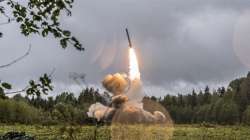Five Russian nuclear engineers buried after rocket explosion
The engineers, who died Thursday, were laid to rest Monday in Sarov, which hosts Russia's main nuclear weapons research center, where they worked. Flags flew at half-staff in the closed city, located 370 kilometres (230 miles) east of Moscow, which has served as a base for Russia's nuclear weapons program since the late 1940s. The coffins were displayed at Sarov's main square before being driven to a cemetery.

Thousands of Russians attended the funerals Monday of five Russian nuclear engineers killed by an explosion as they tested a new rocket, a tragedy that fueled radiation fears and raised new questions about a secretive weapons program.
The engineers, who died Thursday, were laid to rest Monday in Sarov, which hosts Russia's main nuclear weapons research center, where they worked. Flags flew at half-staff in the closed city, located 370 kilometers (230 miles) east of Moscow, which has served as a base for Russia's nuclear weapons program since the late 1940s. The coffins were displayed at Sarov's main square before being driven to a cemetery.
The Defense Ministry initially said the explosion at the navy's testing range in Nyonoksa in the northwestern Arkhangelsk region killed two people and injured six others, but the state-controlled Rosatom nuclear concern acknowledged over the weekend that the blast also killed five of its workers and injured three others.
Rosatom director Alexei Likhachev praised the victims as "true heroes" and "a pride of our country."
"Our further work on new weapons that we will certainly complete will be the best tribute to them," Likhachev said during the funeral, according to Rosatom. "We will fulfill the Motherland's orders and fully protect its security."
Rosatom said the explosion occurred while the engineers were testing a "nuclear isotope power source" for a rocket engine. Local authorities in nearby Severodvinsk reported a brief spike in radiation levels after the explosion, saying it lasted only about 30 minutes and didn't pose any health hazards.
Still, the statement from Severodvinsk's administration came just as the Defense Ministry insisted that no radiation had been released, a claim that drew comparisons to Soviet-era attempts to coverup catastrophes. Spooked residents rushed to buy iodide, which can help limit the damage from exposure to radiation.
Following the explosion, Russian authorities also closed part of Dvina Bay on the White Sea to shipping for a month, in what could be an attempt to prevent outsiders from seeing an operation to recover the missile debris.
Neither the Defense Ministry nor Rosatom mentioned the type of rocket that exploded during the test, saying only that it had liquid propellant.
But Rosatom's mention of a "nuclear isotope power source" led some Russian media to conclude it was the Burevestnik (Petrel), a nuclear-powered cruise missile first revealed by Russian President Vladimir Putin in March 2018 during his state-of-the nation address along with other doomsday weapons.
The U.S. and the Soviet Union pondered nuclear-powered missiles in the 1960s, but they abandoned those projects as too unstable and dangerous.
While presenting the new missile, Putin claimed it will have an unlimited range, allowing it to circle the globe unnoticed, bypassing the enemy's missile defense assets, to strike undetected. The president claimed the missile had successfully undergone the first tests, but observers were skeptical, arguing that such a weapon could be very difficult to handle and harmful to the environment.
Sergei Kirienko, Putin's deputy chief of staff who previously led Rosatom, said at the funeral that the victims were aware of the danger, but "took the risk, realizing that no one else would do the job better than them." He said they would be posthumously awarded with top medals.
ALSO READ | Russia successfully launches Soyuz MS-13 spacecraft into International Space Station
ALSO READ | US against any country purchasing S-400 defence system from Russia: Pentagon